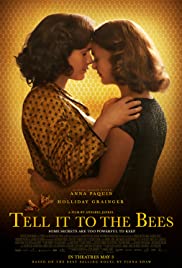
TELL IT TO THE BEES
UK, 2018, 108 minutes, Coloour.
Anna Paquin, Holliday Grainger, Gregor Selkirk, Kate Dickie, Emun Elliott, Euan Mason. Narration by Billy Boyd.
Directed by Annabel Jankel.
A film adaptation of a popular novel, focusing on Scotland and the working class in 1952, focusing on relationships, family, sexual relationships, lesbianism.
The title and what is told to the bees are personal secrets. This serves as a kind of metaphorical motif, many sequences of tending the bees, the hives, the honey, their being loose, swarming… And the young boy of this narrative learning that you tell secrets to the bees, that they hear, that they have influence, illustrates this telling secrets – and a number of sequences where he does this.
The setting is a mill town in Scotland in the early 1950s. Many people work at the local mill, especially the women. We are introduced to Lydia (a strong performance from Holliday Grainger) who had married during the war, some flashbacks to their meeting and the exhilaration of dancing, but the husband has suffered during the war and has abandoned his wife and seven-year-old son, Charlie (an arresting performance by Gregor Selkirk). She has little income, she runs the danger of being evicted from the house, her work is humdrum.
Across the field from their house is a mansion – with bees and hives. It emerges that it is the house of Dr Jean Markham (Anna Paquin in a strong performance). She is friendly to Charlie, allowing him to come to see the bees, his mother upset when she discovers that the doctor has given Charlie a book and invited him to the house, going over in high dungeon, only to find that the doctor is a woman.
There are dramatic moments, especially with the doctor, having come from the village in the past, her father being the local doctor and owner of the mansion, and her trying to establish her practice, feeling her family with the death of a child. Other dramatic moments include Lydia encountering her angry husband, she and Charlie being evicted, their being taken in by Jean.
While audiences would have been alerted to Jean’s sexual orientation and her attraction to Lydia, the latter part of the film focuses on the relationship, the reaction of people in the town, the couple wanting this to be secret, Charlie wanting always the truth from his mother and feeling he was deceived, running away to his father and his father’s family, precipitating an emotional crisis.
The resolution is not quite as expected. There is a plan that the family should go to Canada. There is a crisis with a cousin who has become pregnant by her boyfriend, a black man, and the family organise and impose an abortion. With the woman almost dead, there is a plea for the doctor to come and help – which she does. She does not go to Canada because she feels she should stop running – and farewells Lydia and Charlie as they leave.
The narration, by Billy Boyd, is done by the older Charlie.
1. The title? The visuals of the bees and hives and the honey? The metaphor? Telling secrets to the bees? Their reaction, communication?
2. The Scottish setting, the town, the early 1950s, working class, harshness, poverty? The streets, the interiors? Lydia’s house, more comfortable? The doctor’s mansion? The visuals of the mills, the work, the women? (The flashbacks to dancing during the war years?)
3. Lydia, her age, working at the mill, supervisory role, cigarette breaks, walking home, her cousin, the friendships and the talk? At home, Charlie, the bond between mother and son? The danger of being evicted? The visit of Robert, the memories of the past, his leaving, in the town with his family, her love for him? His impositions? The experience of Charlie invited by the doctor, the loan of the book, her being upset, going to the mansion, discovering the doctor was Jean? The growing friendship? Books, conversations, Charlie and his visits to the bees?
4. Jean, her severe manner, doctor’s qualifications, coming from the village, leaving, her father, her studies, the selling of the house, her coming to work in the town, her office, people’s hesitations, the little girl and her illness, dying, Jean blaming herself? Jean and her friend, his devotion in the past, widower, his daughter? The discussions? The visit to the house, the meal? Jean visiting and his advice, legal advice?
5. Lydia and Charlie, evicted, being taken in by Jean, the comfortable rooms, the run of the house, Lydia and her hard work, Charlie and the bees, Jean and her work?
6. Mother and son, the pledge to tell each other the truth, Charlie and his gradual discovery of his mother’s relationship with Jean? With his friend in the woods, the finding of the bra, watching the lovers? The friends, and about Jean being a Dirty Dyke? Charlie, at seven, hurling the name at his mother? His running away to his father?
7. Jean and Lydia, the attraction, gradual for Lydia, Jean and the attraction, the relationship? Wanting secrecy?
8. Lydia, at work, the accident, her being sacked, drinking in the pub, Charley seeing her, her return home?
9. Robert, his anger, wanting Charlie, Charlie at the house, the abortion issue, Robert and his anger, Charlie running away? Robert coming to the house, finding Lydia? Locking the door, the rape, the fight? His hitting the hives, the bees and their swarming, even into the room?
10. Lydia, protecting Charlie? Jean and her being called by the family to help after the abortion, her saving the girl’s life? The family indebted – and wanting her to return?
11. The issue of Canada, the final decision, Jean not wanting to run away, Lydia and Charlie to go to Canada, that there was a station, the open kiss of the station?
12. The older Charlie as narrator and his perspective is on these experiences?